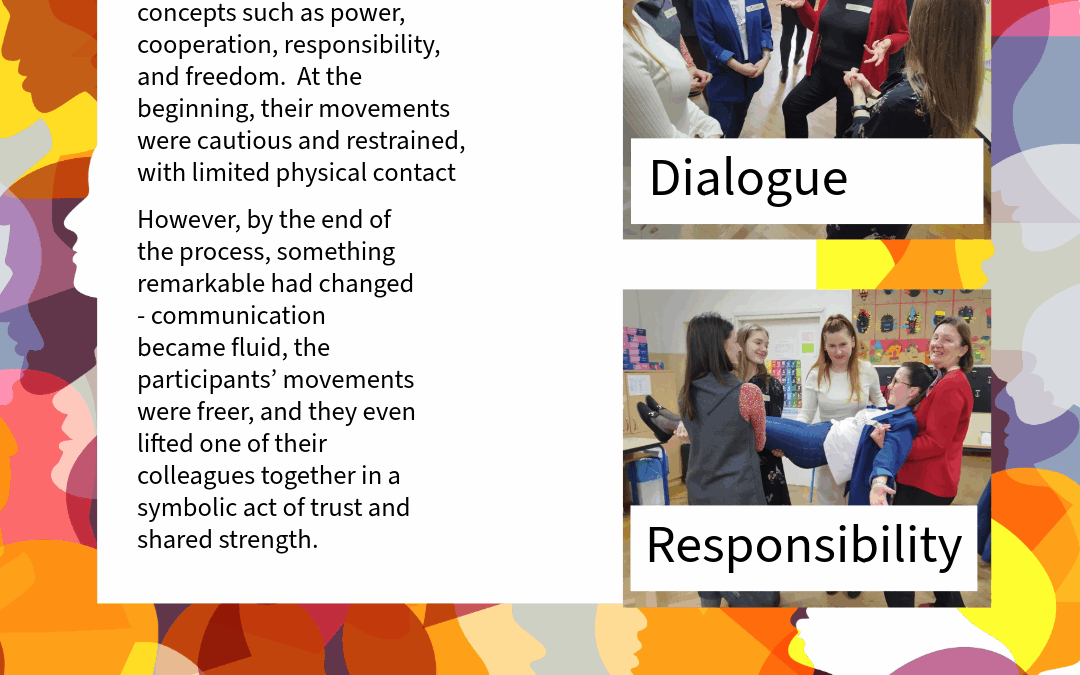Democracy as Becoming: Reflections from the AECED Project
(Inspired by and based on the AECED Framework)
The Republic of Croatia declared independence in 1991, with the aspiration to build a state founded on the rule of law, free elections, and the protection of human rights. Since joining the European Union on July 1, 2013, Croatia has strengthened its democratic foundations and embraced the responsibility of continually developing them. As a young democracy, Croatia is still nurturing its institutions, dialogue culture, and civic participation. In this process, education plays a central role. Schools are not only places of learning but spaces where young people encounter the values of freedom, responsibility, and respect for diversity. Through participatory and creative approaches, education becomes a practice of living democracy – one that is experienced rather than taught.
In 2024, a primary school in Zagreb joined the AECED project, an international initiative exploring how aesthetic and embodied learning can foster democratic education. Ten participants – eight teachers, a school psychologist, and a school pedagogue – took part in a participatory action research (PAR) process involving both in-person and online sessions. The meetings were held between February and June 2024. What made this process unique was its collaborative nature: teachers were not passive recipients of training but active co-creators of knowledge and practice. In a school system that often operates hierarchically, this was both a challenge and an opportunity for professional growth. One of the most memorable activities was the exercise called “Statues.” Participants were invited to use their bodies to create sculptures representing concepts such as power, cooperation, responsibility, and freedom. At the beginning, their movements were cautious and restrained, with limited physical contact. However, by the end of the process, something remarkable had changed – communication became fluid, the participants’ movements were freer, and they even lifted one of their colleagues together in a symbolic act of trust and shared strength. This transformation of bodily expression reflected a deeper internal shift: a collective embodiment of democratic culture. Democracy, they discovered, is not something one learns through theory alone but through lived, embodied experience. Throughout the process, participants emphasized the importance of creating a safe and supportive space where every voice matters and mistakes are part of learning. They realized that democracy requires the courage to listen, to reflect, and to share power -both among adults and with students.
A significant insight was the need for developing facilitation skills. Instead of controlling the classroom, teachers began to see themselves as guides, facilitators of learning processes where students take ownership and responsibility. This shift cultivates a participatory culture, helping students become active citizens who see education as a shared journey rather than a one-way transfer of knowledge. However, the participants also recognized that genuine transformation demands theoretical understanding. Without a deeper grasp of democratic principles, there is a risk of superficial implementation – what one participant called “spray-on democracy.” Sustained teacher education and reflective practice are, therefore, essential for meaningful change.
The project opened important conversations on inclusivity, equality, and intersectionality. Teachers reflected on how factors such as gender, socio-economic status, disability, or migration background shape students’ classroom experiences. They concluded that true democratization of schools must also include sensitivity to these differences – because democracy is incomplete if it is not inclusive.
Another key insight was reflexivity – the ongoing practice of questioning one’s assumptions, privileges, and positions of power. Teachers realized how their daily communication, tone, and classroom decisions shape democratic culture. By engaging in reflective dialogue, they began to see their teaching not only as instruction but as ethical, relational practice. Aesthetic and embodied methods proved to be powerful tools for democratizing school spaces. The body became a medium of expression, connection, and empathy – a living site of learning equality and trust. Through movement, art, and sensory engagement, teachers experienced learning as something deeply personal and emotional. They discovered that democracy, too, is felt in gestures of cooperation, in shared creativity, and in moments of collective reflection.
The AECED project revealed that democracy is not a fixed state but an ongoing process of becoming:
- On a national level, projects like AECED show that education can be a vital space for nurturing democratic culture through creativity, participation, and dialogue.
- On a school level, it inspired teachers to foster more open and participatory classrooms where students have both a voice and a sense of responsibility.
- On a personal level, it offered a deeply transformative experience — one that strengthens awareness, reflection, and belief in democracy as a lived, embodied practice.
In the Croatian context, where democracy is still evolving, the AECED project stands as a reminder: the classroom can be a place of real transformation, a space where democracy is not merely taught, but felt, breathed, and continuously becoming.
Blog written by Maja Drvodelić, University of Zagreb
#Education4Democracy

